|
Thai-Russian US$10 billion bilateral trade deal for the next three years sealed

The deal included targeted value for three-year
bilateral trade from next year to 2023 at US$10 billion, joint efforts to
develop COVID-19 vaccines, and more imports of farm products from Thailand.
Thailand and Russia sealed their eight-point trade deal and expected to
raise the value of bilateral trade to at least US$10 billion in the next
three years.
Commerce Minister Jurin Laksanawisit said both sides
reached the agreement during a video conference of their sub-committee on
bilateral trade and economic cooperation.
Firstly they set the targeted value for three-year
bilateral trade from next year to 2023 at US$10 billion, or about US$3
billion a year, he said.
Secondly Russia proposed joint efforts to develop
COVID-19 vaccines. Thirdly Thailand asked Russia to import more Thai farm
products.
Fourthly Thailand asked Russia to order more natural
rubber from Thailand. Fifthly both countries will promote mutual tourism
during and after the COVID-19 pandemic. Sixthly Thailand and Russia will
promote bilateral e-commerce and online business.
Seventhly both countries will promote multilateral
cooperation with Southeast Asia nations and free trade between Thailand and
Eurasian countries.
Eighthly Thailand and Russia agreed to sign a
memorandum of understanding to expand cooperation between the Thai Ministry
of Commerce and the Russian Ministry of Economic Development.
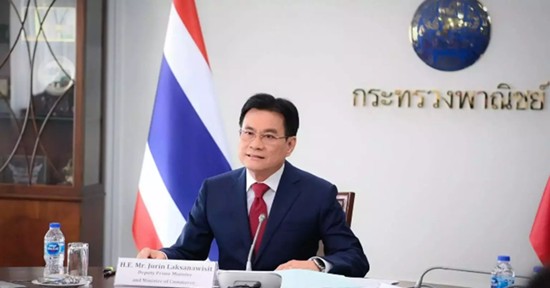
Commerce Minister, Jurin Laksanawisit.
|

|
Thai GDP to fall by 8.3% this year
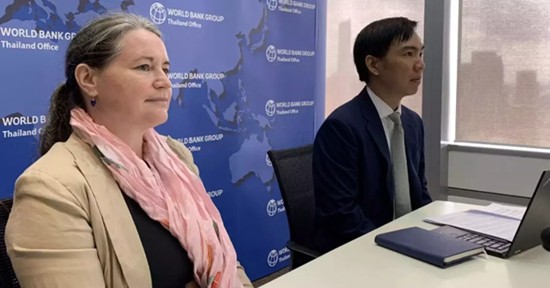
Birgit Hansl,
World Bank Country Manager for Thailand, said Thailand would survive the
COVID-19 crisis because it well controlled the disease and helped affected
people.
The World Bank warns that the Thai economy can shrink
by 8.3% this year and may take nearly three years to recover.
The message is a part of the World Bank’s Economic
Update for East Asia and the Pacific for October.
The report said that the economy of this region would
grow by only 0.9% this year, its slowest pace since 1967. China’s economy
will expand by 2% because it contained the coronavirus disease 2019 in March
and has increased government investments since.
Meanwhile, the economies of other countries in the
region will contract by 3.5% on average. The Thai economy can shrink by
8.3-10.4% this year, according to the World Bank.
Birgit Hansl, World Bank Country Manager for Thailand,
said Thailand would survive the COVID-19 crisis because it well controlled
the disease and helped affected people. She suggested the Thai government
balance health policies against economic ones, improve economic stimulus
measures to better reach target groups and maintain employment.
Kiatipong Ariyapruchya, World Bank’s senior country
economist for Thailand, said the Thai gross domestic product this year could
fall by 10.4% if the country faced the second wave of COVID-19 in addition
to flooding and political uncertainty.
The 8.3% contraction would take two years for GDP
recovery to the pre-COVID level but it would take as long as three years if
the contraction rate reached 10.4%, he said.
The World Bank’s report also stated that poverty in the
region tended to rise for the first time in 20 years with the number of the
poor to reach 38 million this year and COVID-19 was creating a class of “new
poor”. (TNA)
|

|
Thailand Mooncake Festival on Oct 1 may see sales shrink by 16%

Sales of
mooncake are estimated this year at about 800 million baht, down by 15.8%
from last year.
Mooncake sales are shrinking by about 16% due to
economic problems, the Kasikorn Research Center said.
The center estimated mooncake sales this year at about
800 million baht, down by 15.8% from last year.
It explained that the coronavirus disease 2019 pandemic
heavily affected purchasing power and would reduce the number of visitors to
the Mooncake Festival on Oct 1 and the overall sales of mooncakes.
The impact would be serious for the producers who
conventionally sold expensive mooncakes to tourists. Those who had regular
customers and sold affordable mooncakes should be less affected, the center
said.
Mooncake producers would still participate in the
Mooncake Festival on October 1 to maintain their brand awareness and
customer base while waiting for economic recovery. Weak purchasing power and
fierce competition were their major challenges, the research center said. (TNA)

Mooncake
producers would still participate in the Mooncake Festival on October 1 to
maintain their brand awareness and customer base while waiting for economic
recovery.
|

|
Bank of Thailand forecasts -7.8% GDP drop, maintains policy rate at 0.50%

Titanun
Mallikamas, Bank of Thailand’s assistant governor supervising the Monetary
Policy Group.
The Bank of Thailand’s Monetary Policy Committee (MPC)
maintained the policy rate at 0.50% and revised its forecast on the gross
domestic product decline from -8.1% to -7.8% this year.
Titanun Mallikamas, Bank of Thailand’s assistant
governor supervising the Monetary Policy Group, said the committee resolved
unanimously to keep the policy rate unchanged because it expected a slightly
less decline of the Thai economy and the headline inflation to gradually
rise next year.
The committee viewed that financial institutions should
quickly restructure household and business debts regarding more risks in the
financial system of the country.
The MPC predicted that Thailand would welcome 6.7
million visitors this year and 9 million next year. The committee revised
its forecast down from its earlier estimation of 8 million visitors this
year and 16 million next year.
The MPC expected that the Thai GDP would slowly recover
and take at least two years to return to its pre-COVID level late last year.
The government needed to improve its economic stimulus measures, promote
employment and restructure the national economy, Mr Titanun said. (TNA)
|

|
Thailand to stop transferring 5,000-baht in cash relief on Sept 30
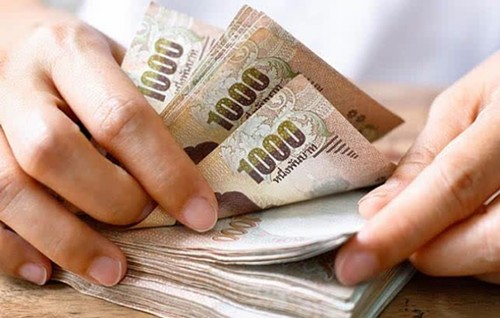
Thai
Ministry of Finance has transferred 5,000 baht in cash relief to all 15.3
million eligible citizens and will continue the transfer efforts until
September 30, 2020.
The Ministry of Finance has transferred 5,000 baht in
cash relief to all 15.3 million eligible citizens. However, some people have
yet to receive the financial aid, as their bank accounts are not linked to
the PromptPay service or they have already been closed.
The Director of the Fiscal Policy Office (FPO) and
Spokesman for the Ministry of Finance, Lawaron Sangsanit, said that the
ministry has repeatedly tried to transfer the aid payments to about 56,000
remaining applicants each week. The ministry will continue the transfer
efforts until September 30, 2020.
People, who have yet to receive the 5,000-baht cash
handout, can check whether they are in this group of applicants by visiting
"เราไม่ทิ้งกัน"
website. They can click on a dark green button with the label "Eligible
persons who have not successfully received transferred money". If they are
in this group of applicants or receive a short message service (SMS) message
to confirm their status, they are advised to contact their respective bank,
so that their accounts are linked to the PromptPay service before September
28. After September 30, the ministry will consider closing the project and
ending the transfer.
Eligible applicants, who have yet to receive the
government’s financial aid, are advised to have their bank accounts linked
to PromptPay as soon as possible. (NNT)
|

|
Ex-WTO chief positive Thai economy will improve next year
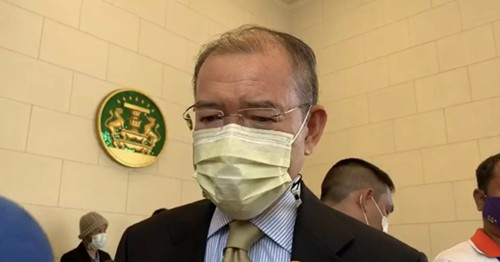
Mr Supachai
Panitchpakdi, former Director General of the World Trade Organization (WTO).
A former chief of the World Trade Organization has
expressed an optimistic outlook on the Thai economy, expecting rapid
recovery early next year.
Mr Supachai Panitchpakdi, a former Director General of
the World Trade Organization (WTO) disclosed today that he expects Thai
economic recovery post COVID-19 to take some time, starting in Q3 and Q4
this year, with a better performance expected early next year.
He said Thailand is considered among countries in the
Asian region that have managed the COVID-19 pandemic well, and expected the
authorities to be able to control the situation should there be a second
wave of infections.
The former WTO chief and national strategy board’s
senior adviser said however the economy’s recovery is not able to commence
fully just yet due to problems faced around the globe, while the government
must provide support to the general public and businesses of all types to
prolong their operations, protect society from further damage, as well as
provide more help to informal workers, senior citizens, and unregistered
persons with disabilities.
According to Mr Supachai, the Thai economy in Q3-Q4
this year will see less shrinkage and improved consumer confidence. He also
stressed the importance of international cooperation between all countries
in order for the world to recover from this global crisis.
Mr Supachai also denied a claim he has been offered the
position of the new Minister of Finance by the Prime Minister. (NNT)
|

|
Thailand endeavors electric vehicle roadmap

The Ministry of Industry aims to increase
electric car production to 30 percent of the total car production over 10
years.
From now on, the Thai automotive industry will move
towards advancing technology driven by electricity. The Ministry of Industry
aims to increase electric car production to 30 percent of the total car
production over 10 years and will launch measures to encourage people to
exchange their old cars for new electric vehicles.
Industry Minister Suriya Juangroongruangkit told the
“New Generation of Automotives” seminar this week, about the Thai electric
vehicle industry’s development plan. The short-term goal is to produce more
than 60,000-110,000 government vehicles, public buses, electric taxi
motorcycles and other personal vehicles. The medium-term goal is to produce
about 300,000 ECO electric vehicles (EVs) and Smart City buses. The
immediate goal is to produce 750,000 EVs.
The Ministry of Industry will accelerate an improvement
in the quality of electric vehicles and study guidelines for continual
industry development in order to promote the recycling of materials
according to the concept of a circular economy, to achieve a systematic
vehicle management mechanism.
The Ministry of Industry will offer tax incentives for
individuals and companies to exchange their old cars for new cars or
electric vehicles. The scheme will apply to used cars 15 years old or older
and will boost sales of new cars and e-vehicles and reduce pollution. The
scheme is being discussed by the Ministry of Industry, private agencies and
related agencies. (NNT)

Industry Minister Suriya Juangroongruangkit.
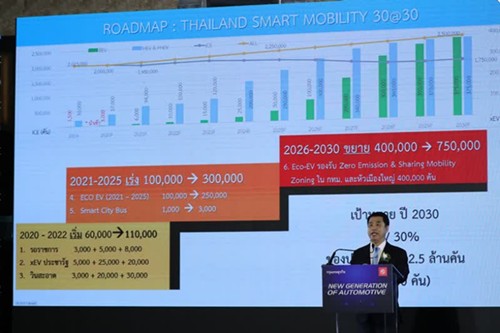
The medium-term goal is to produce about 300,000
ECO electric vehicles (EVs) and Smart City buses. The immediate goal is to
produce 750,000 EVs.

The “New Generation of Automotives” seminar this
week, about the Thai electric vehicle industry’s development plan.
|

|
Thai exports in July fall 11.37% year-on-year
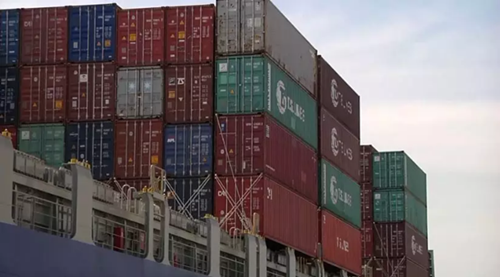
The July’s exports contracted 11.37%
year-on-year to US$18.8 billion. Exports for the first seven months dropped
7.72% to $133 billion.
Thai exports contracted 11.37
percent in July due to the COVID-19 pandemic but there are signs for gradual
improvements, the Ministry of Commerce reports.
Pimchanok Vonkorpon, Director-General of the Ministry’s
Trade Policy and Strategy Office, said that although the contraction
continued but the Ministry believed the worst slump was over.
The July’s exports contracted 11.37% year-on-year to
US$18.8 billion. Exports for the first seven months dropped 7.72% to $133
billion, according to Pimchanok.
In the meantime, imports went down 23.68% to $15.5
billion, compared to the same month last year. The trade surplus stood at
$14 billion.
The ministry was more optimistic about trade prospects,
said Pimchanok, projecting 2020 exports to decrease 7-8 percent, much better
than previous forecasts.
The value of exports to major trading partners
contracted at a lower rate, she said. (TNA)
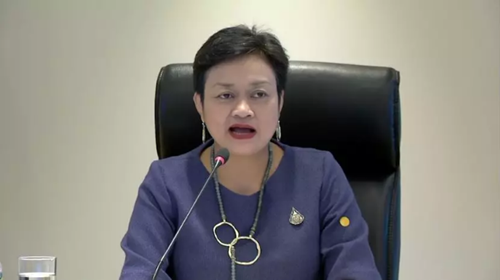
Pimchanok Vonkorpon, Director-General of the
Ministry’s Trade Policy and Strategy Office.
|

|
All commercial banks in Thailand are strong

Ronadol
Numnonda, Bank of Thailand (BoT) deputy governor for financial institutions
stability.
The Bank of Thailand (BoT) has confirmed that all
commercial banks in the country are financially strong.
In response to an economist’s warning that Thai
commercial banks were suffering from economic problems, Ronadol Numnonda,
BoT’s deputy governor for financial institutions stability, said the
operations and funds of all commercial banks remained strong and could cope
well with the economic problems that resulted from the coronavirus disease
2019.
Since early 2020, the excess reserves of commercial
banks were huge thanks to a strict provision policy implemented over the
past years. As of June 2020, the capital ratio of commercial banks was as
high as 19.2%. Besides, the banks continued to post profits and have high
liquidity, he said.
In addition, commercial banks already conducted stress
tests which confirmed that they had considerable funds and could cope with
crises.
Meanwhile, the government and BoT issued swift monetary
and financial measures to relieve the impacts of COVID-19 on people and
businesses. As a result, affected people and businesses were able to repay
their debts as usual, Mr Ronadol said.
BoT and financial institutions were cooperating closely
on helping debtors and restructuring their debts and thus commercial banks
could limit their non-performing loans, he said.
BoT assured that Thai commercial banks remained strong
and were able to cope with the economic impacts of COVID-19. (TNA)
|

|
Support boosted for SMEs in aviation industry in Thailand
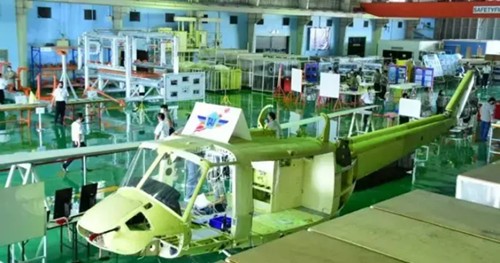
The Office
of Small and Medium Enterprises Promotion (OSMEP) and Thai Aviation
Industries Co (TAI) are supporting local SMEs to supply parts for aircraft
maintenance.
The Office of Small and Medium
Enterprises Promotion (OSMEP) and Thai Aviation Industries Co (TAI) are
supporting local small and medium-sized enterprises (SMEs) to supply parts
for aircraft maintenance.
OSMEP director-general Veerapong Malai said the SMEs
that were members of the Thai Subcontracting Promotion Association were
improving their capabilities to supply parts for the aircraft maintenance
business of TAI after their representatives had inspection trips at aircraft
maintenance centers in Nakhon Sawan and Lop Buri provinces.
Parts from the SMEs would soon form about 30% of whole
aircraft that TAI maintained and the percentage would be increasing, Mr
Veerapong said.
OSMEP and TAI would propose a policy that would
encourage governmental organizations to use the local parts for their
aircraft maintenance and the SMEs would receive a special favor in vying for
aircraft part supply contracts with the right to quote prices 10% higher
than the lowest quotation in each bidding contest, he said.
The air force hires TAI 4.5 billion baht a year to
maintain its aircraft.
TAI managing director ACM Siripol Sirisap said TAI and
the Directorate of Aeronautical Engineering would transfer their technology
and production expertise to Thai SMEs, especially those concerning the
equipment that did not require high technology. (TNA)
|

|
‘Global Business Matching 2020’ promotes partnership for Thai SMEs

The Bank of
Agriculture and Agricultural Cooperatives and Export-Import Bank of Thailand
(EXIM) jointly launched Global Business Matching 2020 programme on Friday.
Thai SMEs in the agriculture
sector are getting help in finding business partners in neighbouring
countries via a business matching programme.
The Bank of Agriculture and Agricultural Cooperatives
and Export-Import Bank of Thailand (EXIM) jointly launched Global Business
Matching 2020 programme on Friday.
Supant Mongkolsuthree, chairman of EXIM Bank’s board of
directors, said the programme was designed to help SMEs create partnership
for online trade in ASEAN, especially CLMV countries – Cambodia, Laos,
Myanmar and Vietnam.
Last year, Thai SMEs in the agriculture sector exported
500 million-baht worth of goods to their business partners overseas, said
Supant.
This business matching programme could catalyze exports
of Thai farm products, he said.
Thailand aimed to promote exports of farm products as
one of the main economic engines generating 1.2 trillion baht or 10 percent
of GDP, according to Supant. (TNA)
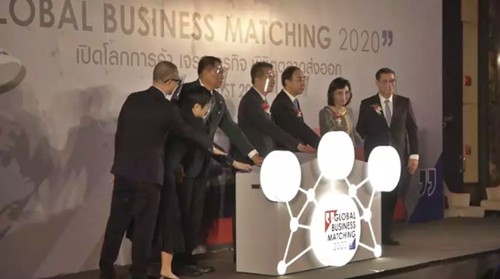
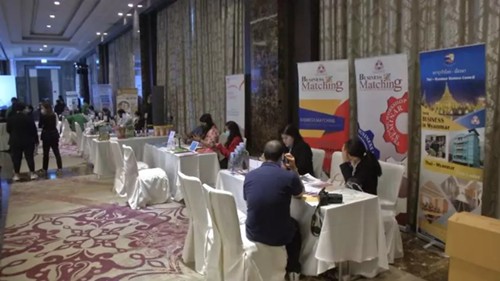
|

|
Economic stabilization the key for ‘Thailand Rebounds’
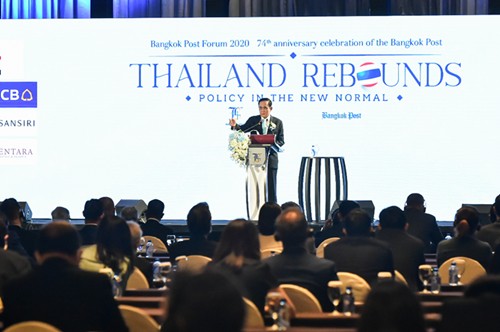
Prime
Minister and Defense Minister Gen. Prayut Chan-o-cha.
At Centara Grand at Central Ladprao Hotel, Prime
Minister and Defense Minister Gen. Prayut Chan-o-cha delivered a keynote
speech, on occasion of the 74th anniversary of the Bangkok Post newspaper,
under the topic "Thailand Rebounds, Policy in the New Normal''.
The Prime Minister congratulated the 74th anniversary
of the Bangkok Post, and emphasized that good mass media is a key
infrastructure to national stability, as it would present the public with
multi-dimensional facts and right-to-the-point opinions, thereby, creating
public understanding, and reducing conflict and social disparity.
According to the Prime Minister, economic stabilization
is a key for the country’s rebound. It is important for Thailand to promote
and reinforce domestic and grassroots economy, especially infrastructure
development and implementation of relief and rehabilitation measures, e.g.,
promoting domestic tourism, reducing people’s burden on household expenses,
providing subsidies to affected people, debt restructuring, etc., in a bid
to alleviate people’s plights and enable them to sustain themselves through
the COVID-19 situation.
The Government has also put forward the Royal Decree
authorizing Ministry of Finance to seek loan for economic and social problem
solving, remedy, and rehabilitation as a result of spread of COVID-19, B.E.
2563 (1-trillion Baht Loan), which has been enacted as a quick win to
maintain national stability. Budget allocated under the Royal Decree would
enable implementations according to the Government’s medical and public
healthcare plan against COVID-19 pandemic, and post-COVID-19 economic
rehabilitation plans through investment and economic-related activities. The
Royal Decree is also aimed to remedy the people economically affected by the
situation, and accommodate the “New Normal” way of life. Focus will be made
on projects that promote community’s economic growth in a sustainable
manner, which is fundamental to the rebound of Thai economy. At the same
time, preventive public healthcare measures against COVID-19 must continue
to be implemented in parallel.
The Government also strives to improve public
administrative procedure to enhance engagement of the people. The Prime
Minister emphasized that we need to turn the crisis into an opportunity for
Thailand to be restored and become even better than before. People of all
sectors need to put collective effort under the working principle “Unifying
Thailand, Building the Nation” to get through the crisis. According to the
Prime Minister, we all will “survive today and be stronger tomorrow”.
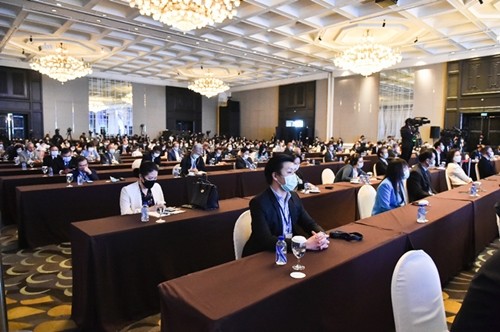
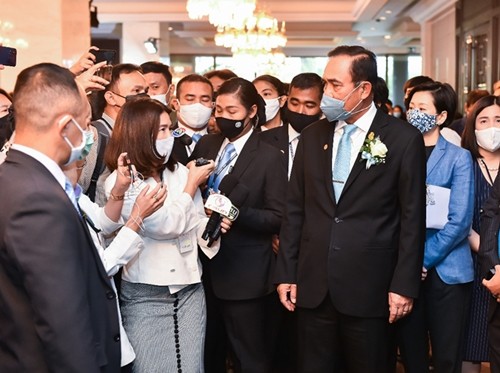
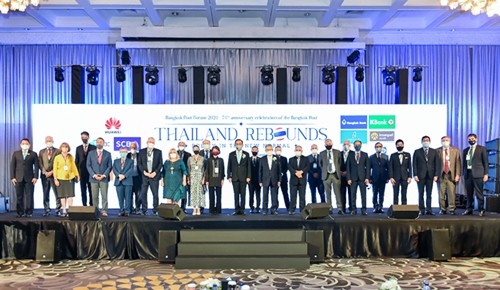
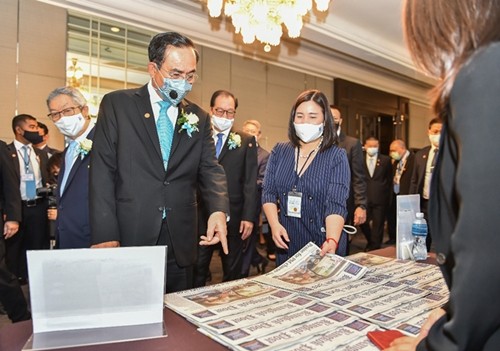
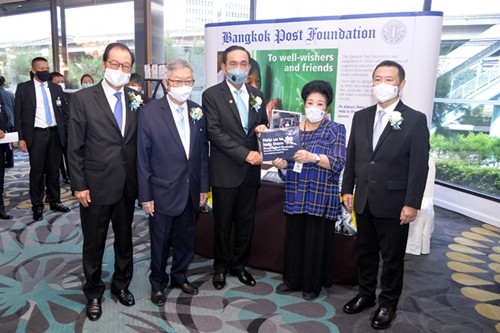
|

|
Thai economic recovery to take 2-3 years
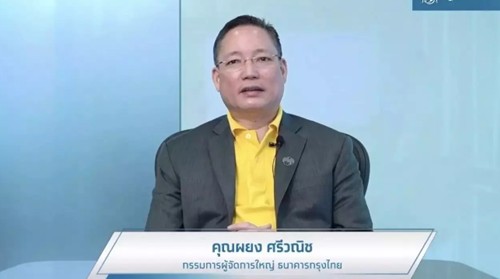
Krungthai Bank president,Payong Srivanich.
Krungthai Bank stated that the
coronavirus disease 2019 had global impacts and it would take 2-3 years for
economic recovery while health and digital business had a bright future.
Krungthai Bank president Payong Srivanich quoted the
United Nations as stating that the COVID-19 pandemic was the worst crisis
since World War II.
Next year COVID-19 would cause severe contraction to
60% of the global economy and it would take 2-3 years for economic
restoration. However, Thailand was in a better position than many countries
thanks to its monetary and financial discipline, adaptation and
digitalization in the private sector.
The Krungthai COMPASS research center predicted that
the Thai economy would shrink by as much as 8.8% this year. The downturn
would be close to what happened in the Tom Yum Kung economic crisis.
It pointed out that COVID-19 brought a bright future to
health business and accelerated technological development. In April there
were more than 10 million Prompt Pay transactions a day, doubling last
year’s transactions. (TNA)
|

|
‘GI Market 2020’ gathers unique items from around Thailand
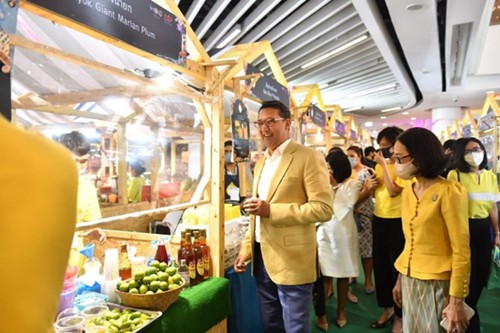
Thosapone Dunsuputra, Director General of
Department of Intellectual Property.
‘GI Market 2020’ is an event that brings together Geographical Indication
products from all over the country and is hosted by the Department of
Intellectual Property at Central Plaza Rama 9. The event will last until 2nd
of August, so make sure you don’t miss the special items.
The event is usually held twice a year, but due to
COVID-19, the event was postponed to this month and in late August. It
brings many geographical indication products, such as Chanthaburi Durian,
Golden Longan from Ban Phaeo, Nakhon Nayok’s Marian plums, Fermented Sea
Catfish from Phatthalung, Mae Hong Son’s Tiger-Stripe peanut, Sakon Nakhon’s
Indigo cloth, Ban Chiang’s earthenware and many more, including 19 GI
products that have been registered this year.
Thosapone Dunsuputra Director General of Department of
Intellectual Property says “Due to the COVID-19 crisis, people can hardly
sell a thing. The department helped them move to the online market, for
those who are capable, because some agricultural products don’t last long
enough for the delivery process. Now it’s better. Events can be held. We
also installed protective screens and require everyone to put on a mask to
avoid the disease.”
In addition, there are also seminars to inspire and
help local product producers to find new markets. The seminars cover many
topics, such as advertising and how to use the GI title as a marketing tool.
Once again, the event lasts until the 2nd of August at
the Central Plaza Grand Rama 9. (NNT)
|

|
Thailand to host ‘CCA 2020’ first world-class beauty trade fair in Southeast Asia

COSMOPROF
CBE ASEAN (CCA 2020)will be held from December 14 - 16 at IMPACT Exhibition
and Convention Center, Muang Thong Thani.
The Federation of Thai Industries (FTI)
has signed a Memorandum of Understanding (MoU) with Informa Markets to host
COSMOPROF CBE ASEAN (CCA 2020), the first world-class beauty trade fair in
Southeast Asia, to support Thai entrepreneurs and enhance their
competitiveness on the world stage.
The signing of this MoU is a sign of cooperation on
driving the Thai beauty business sector, especially SMEs, to be able to
compete in international markets by using the CCA 2020, the world-class
beauty trade fair, held for the first time in Southeast Asia, as a platform
for showing the potential of new products and innovations from Thai
entrepreneurs.
FTI Chairman Suphan Mongkolsuthi said the event will be
held from December 14 - 16 at IMPACT Exhibition and Convention Center, Muang
Thong Thani. He expressed his confidence that it will help attract foreign
investors, support Thai SME entrepreneurs with opportunities for business
networking, expand the Thai beauty business to the world market and promote
Thailand’s strength as a hub for the health and beauty industries in ASEAN.
(NNT)
|

|
Shopping malls in Bangkok organize big discounts festival to boost domestic consumption
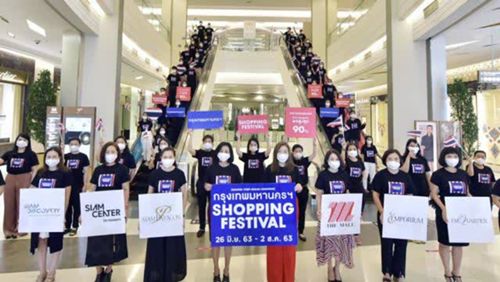
The Mall,
The Emporium, Emquartier, Siam Paragon, Siam Center and Siam Discovery, join
"Bangkok Shopping Festival" an extravaganza offering discounts of up to 90
%.
The Mall Group has organized a shopping
festival offering discounts of up to 90 percent at six of its locations,
intended to stimulate the economy weighed down by the COVID-19 pandemic.
Participating stores are The Mall, The Emporium,
Emquartier, Siam Paragon, Siam Center and Siam Discovery, which are hosting
the ‘Bangkok Shopping Festival’ an extravaganza offering discounts of up to
90 percent from June 26 to August 2.
The festival includes spaces for vendors affected by
COVID-19 free of charge within areas dubbed the ‘Siam Smile Flea Market’.
The Mall Group’s Chief Marketing Officer, Woralak
Tulaporn, said this week that consumption remains sluggish as consumers are
still wary of the effects of the COVID-19 situation. Most buyers have
focused on necessities or schooling needs, with retailers still working to
recover, even with the fourth phase of regulation relaxation announced by
the government. Only 60 percent of consumers are expected to be shopping at
department stores at this time, necessitating the stimulus event.
Even after the fifth phase relaxation of social
measures, which will include opening Thai air space, takes place, Ms.
Woralak said there is no certainty consumption will recover, noting that up
to 40 percent of retailers depend on foreign tourists who may not be able to
leave their countries at this stage. (NNT)
|

|
New York Times praises Thai fruit delicacies despite peeling effort
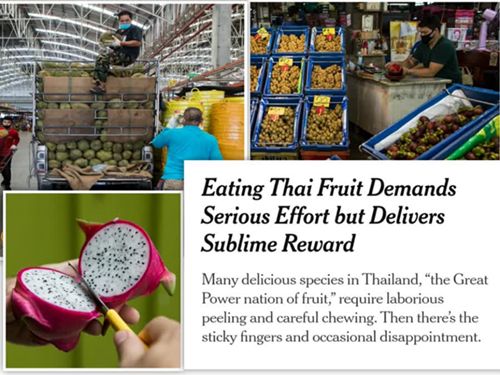
Thailand’s
famous fruit highlighted in the New York Times included Lychee, jackfruit,
rambutan, mangosteen, salak, and durian.
A recent online post in the New York Times has
recognized the quality of Thai fruit, saying "Eating Thai Fruit Demands
Serious Effort but Delivers a Sublime Reward."
In its publication earlier this week, the paper offered
its readers insight into Thai fruit delicacies, as the kingdom is now
entering its peak fruit season.
The kingdom’s famous fruit highlighted in the newspaper
included Lychee, jackfruit, rambutan, mangosteen, salak, and durian.
The paper says the “region’s fruits are like no other”
but despite being both unique and yummy, they all need quite serious
commitment to eat.
With the many different fruit on offer, the kingdom is
currently ranked the world’s sixth biggest fruit exporter, with China being
the biggest customer.
Those interested in reading more of this article can
search for “Eating Thai Fruit Demands Serious Effort but Delivers a Sublime
Reward.” On New York Times. (NNT)
|

|
Thailand exporting lowest in 4 Years
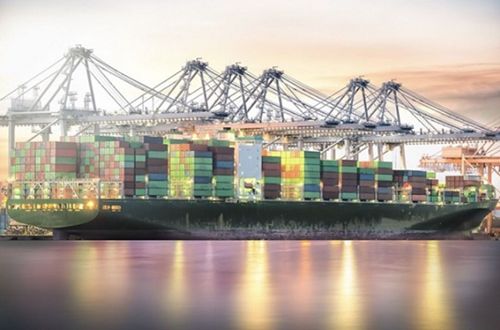
Worldwide demand and supply shrank due to the
COVID-19 pandemic as well as the production that had plunged due to the
lockdowns.
Thai exports in May showed the lowest level in four years due to the
coronavirus disease 2019 (COVID-19) pandemic, according to the Commerce
Ministry.
Pimchanok Vonkorpon, director-general of the ministry’s
Trade Policy and Strategy Office, said the export value in May was at
US$16.28 billion, down by 22.50% year-on-year, and the import value was at
US$13.58 billion, falling by 34.41%.
The May export was the lowest in four years and its
increase rate was the lowest in 130 months or more than 10 years from July
2009, she said.
Demand and supply shrank due to the COVID-19 pandemic.
Production plunged because of worldwide lockdowns and the income of trading
partners was affected, Ms Pimchanok said.
“The impacts happen worldwide and it cannot be
predicted when the situation should end,” she said.
However, the exports of farm products and foods remained promising as they
grew by 22%, up from 15% in the same period last year.
“The markets for this group of exports must be
protected and such an incident in Germany where infections happened at
slaughterhouses must be prevented,” Ms Pimchanok said.
In May, Thailand posted a trade surplus of US$2.69
billion. In the first five months of this year the trade surplus amounted to
US$9.09 billion due to US$97.89billion exports, down by 3.71%, and US$88.80
billion imports, down by 11.64%. (TNA)
|

|
Thailand’s economy to shrink 5-6 % in 2020
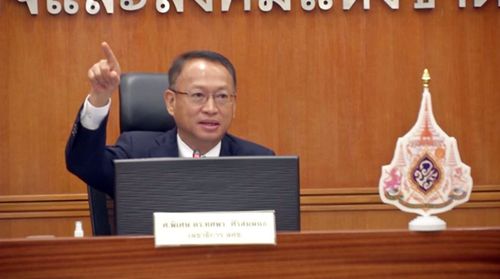
NESDB Secretary General Tossaporn
Sirisamphan.
Thailand’s economy contracted 1.8 percent in the first quarter and is
projected to shrink 5-6 percent this year, says the National Economic and
Social Development Board (NESDB)
NESDB Secretary General Tossaporn Sirisamphan said that
the quarterly contraction was the first since 2014 and the GDP would further
drop in the second quarter due to the coronavirus pandemic.
The NESDB also projected country’s total exports to
decrease by 8 percent.
“These projections are based on the assumptions that
the virus is contained by the second quarter and the economic and tourism
activities return to normal in the latter half of the year”, said Tossaporn.
Commenting on the government’s plan to acquire 1
trillion- baht worth of loan, the NESDB chief said that the injection would
not significantly stimulate the GDP.
Tossaporn also cited the US-China trade war and the
drought disaster as main affecting factors.
Due to the effects of the COVID-19 virus, the tourism
industry could lose at least 150 billion baht in revenue, the NESDB said in
a report released earlier.(TNA)
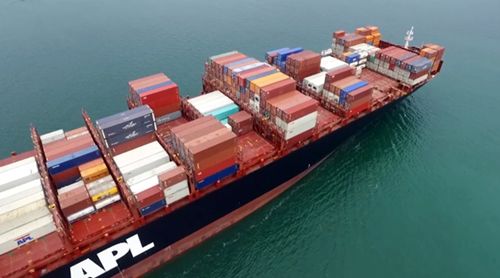
|

|
Thailand to set up fund to help small businesses
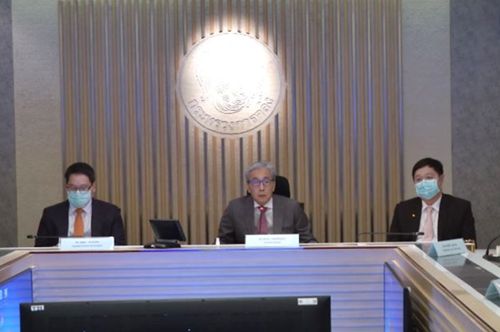
Deputy Prime Minister Somkid Jatusripitak
(center).
BANGKOK- Many small businesses are affected by the coronavirus
outbreak and lacking access to financial sources. In a meeting of economic
ministers and the Bank of Thailand on Thursday, Deputy Prime Minister Somkid
Jatusripitak said that he instructed the Finance Ministry to finalize the
plan to support small businesses.
Finance Minister Uttama Savayanaya said that the fund
might be worth up to 100 billion baht allocated from the 400-billion-baht
emergency loan for COVID-19.
Eligibility verification could be tricky, he said,
because many small businesses had no financial records. Officials might
have to survey their actual locations in order to approve their eligibility.
Uttama also revealed that the Ministry planned to
announce its GDP forecast on Monday which would definitely shrink due to
COVID-19. (TNA)
Shopping malls in Thailand prepare to reopen
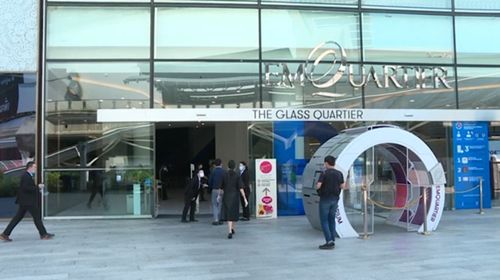
Shopping
malls in Thailand are preparing for reopening.
BANGKOK- The government is
mulling the second phase of easing coronavirus restrictions.
After the first stage of easing which has seen some
restaurants, barber shops and salons reopened, the government’s COVID-19
taskforce has announced that it plans to allow shopping malls as well as
health and wellness businesses in the next stage which could begin next
week.
The operators of the shopping malls that have been
closed since March 22 are gearing up with their preparations for reopening.
Health screening, density limit and social distancing
measures would be taken when they resume operations, the management of one
of the major shopping malls said.
The high-density venues can reopen if the number of new
Covid-19 infections continues to drop, according to the government’s
coronavirus taskforce. The taskforce is expected to announce its decision on
the second phase of lockdown easing on Friday.
An analysis report by Siam Commercial Bank indicates
that retailing businesses have shrunk by 14 percent, translating into about
500- billion baht of loss as a result of the coronavirus pandemic. (TNA)
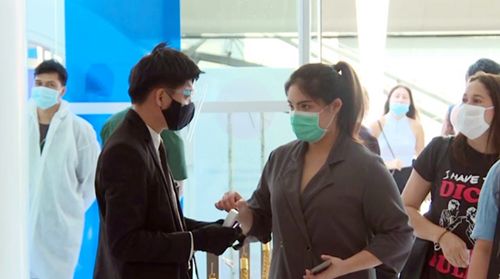
Health
screening, density limit and social distancing measures would be exercised
upon reopening.
|

|
Bangkok Governor extends Chatuchak Market opening hours
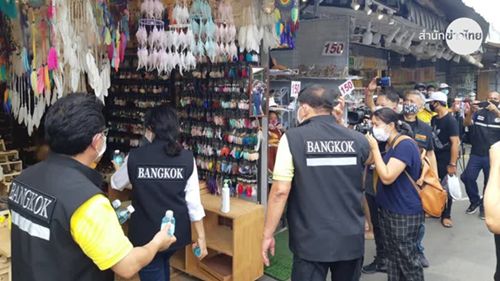
Asawin
Kwanmuang, Bangkok Governor and of the Bangkok Metropolitan Administration
officials inspected COVID-19 prevention measures at Chatuchak Weekend Market
on Sunday.
The Bangkok Governor today issued an
order to extend Chatuchak Market opening hours to support shopkeepers and
customers, with a further hour of shopping time. The market is now open from
5 a.m. to 7 p.m. Customers and shopkeepers are asked to maintain appropriate
personal distance and follow the regulations.
Asawin Kwanmuang, Bangkok Governor along with officials
of the Bangkok Metropolitan Administration or BMA inspected COVID-19
prevention measures at Chatuchak Weekend Market on Sunday. After being open
for two days, they found that during the hot season customers tend to come
in the afternoon around 2 to 5 p.m. The governor therefore decided to extend
opening hours, so that now shopping ends at 7 p.m., instead of 6 p.m.
The BMA is also preparing to cut rents for traders, a
plan now being proposed to the Minister of Transport. The plan aims to cut
rent payable from March to November as customer numbers are much lower than
usual.
However, it was noted that social distancing in the
market is sometimes forgotten by shoppers. As a result, the governor has had
officials draw lines on the ground all over the market as a reminder to
maintain personal distance.
A big cleaning operation was also undertaken on Monday.
The governor has asked all customers and shopkeepers to
follow anti-pandemic measures. Violators will be warned first, so that it
may not be necessary to enforce the harsh provisions of the law.
As for the market’s COVID-19 control measures, only 6
of 13 entrances are open, everyone must wear a mask and have their body
temperature checked. Hand sanitizers are provided at every entrance and
other spots around the market. Toilets are cleaned every 2 hours.
Food vendors must work behind a plastic screen and all
containers must have a lid. Shops are allowed to have a maximum of five
customers inside at any one time in small shops, with a 10-person maximum in
larger shops. Meanwhile, the area normally reserved for street vendors
around the clocktower, and the night market are still closed. (NNT)
|

|
TOT, CAT introduce affordable home internet package in Thailand
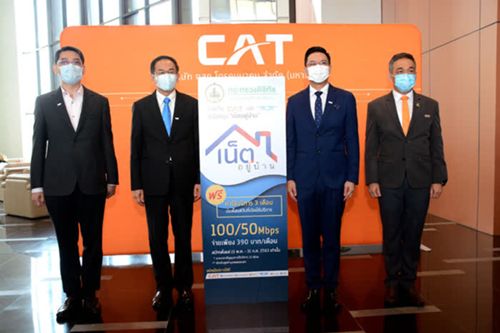
TOT and CAT Telecom offer a new fixed broadband
home internet package to facilitate online communications, work and study
from home.
BANGKOK - The coronavirus pandemic is forcing more people to stay at
home, making a capable internet connection essential for work and study
online. The Ministry of a Digital Economy and Society has joined interests
with telecom providers to offer a special home internet package, with free
installation and a 3-month bonus.
The Minister of a Digital Economy and Society,
Puttipong Punnakanta has announced that telecom providers TOT and CAT
Telecom will be offering a new fixed broadband home internet package, with
100 Mbps download and 50 Mbps upload speeds, to facilitate online
communications, as well as work and study from home.
The new package will be offered at 390 baht per month
for households with no internet connection. Customers will receive a free
3-month bonus after the first 12 bills. The companies aim to offer this
package to 100,000 customers, helping more people have access to the
internet at an affordable price.
TOT Acting President Pipat Khanthong, said today the
membership fee, equipment costs, and installation fees will be waived.
Customers in remote areas can also sign up, thanks to the Net Pracharat
village internet infrastructure that covers more than 24,000 networks
nationwide.
Interested persons can sign up for this special package
from 10th May to 31st July this year, by calling CAT Telecom cell center
1322, or TOT call center 1100. (NNT)
|

|
2,100 migrant workers tested for Covid-19 in Samut Sakhon, Thailand
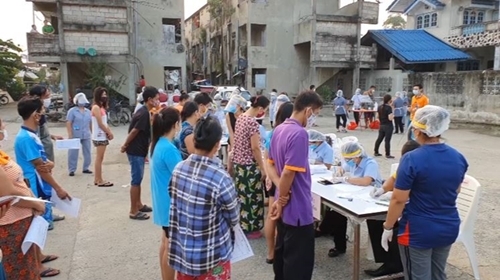
Thai health officials conduct a random testing
of 2,100 migrant workers in Samut Sakhon province.
SAMUT SAKHON - Thai health officials conduct a random testing of
2,100 migrant workers in Samut Sakhon province for COVID-19 in an attempt to
contain the outbreak.
Public health volunteers have since Monday begun
door-to-door testing at a community of migrant workers, mostly from
Myanmar, who are employed in fishery industry.
The testing is supported by provincial disease
control committee, local hospitals and the Department of Medical
Sciences.
Around 500 people have been tested so far as
officials set the target at 2,100. Test results will be completed in
two weeks.
Samut Sakhon Governor Wirasak Wichitsaengsri said
the random testing in the province, home to over 268,000 migrant
workers, served as a model for advanced community testing.
The testing was instrumental in detecting virus
cases in communities leading to effective disease control, he said.
Public health volunteers handed out social
distancing and sanitary guidelines for the workers as well. (TNA)
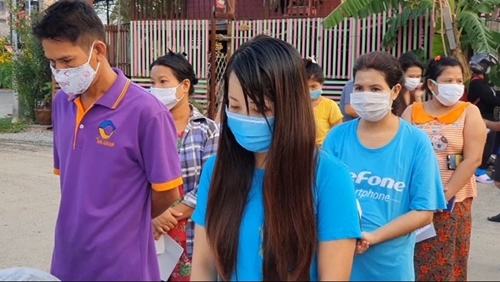
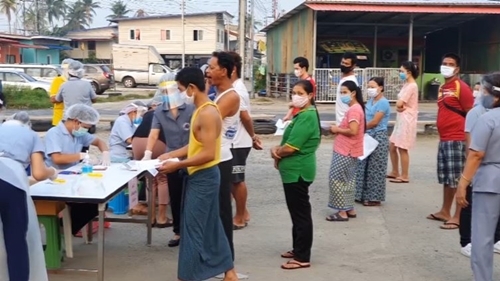
|
|
 |
|

